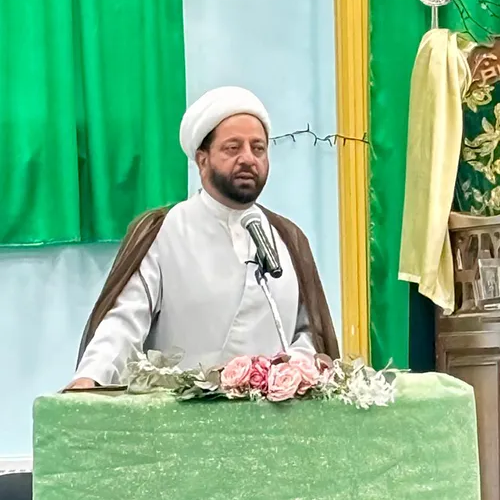Sheikh Jafar Najm
Interview with Sheikh Jafar Najm. Najm
In this week’s Friday bulletin, we hosted an Imam who, in addition to answering our questions, also shared some personal thoughts. His main audience is some of the Friday Imams in East London, but this issue can happen anywhere and, in any city, and neglecting it could lead to religious problems. Sheikh Jafar Najm, the Imam of Sakina Trust Centre in East London, is our guest this week.
Question 1: Sheikh. Najm, thank you for your time. First, could you introduce the Friday prayers at the Sakina Trust Centre?
The Friday prayers at the Sakina Trust Centre have been ongoing since 1992, and I have served as the Friday Imam of Sakina Trust, the largest Shia centre in East London, for 24 years. The congregation at this centre consists of people from various nationalities, including Pakistani, Afghan, Iraqi, Iranian, Azerbaijani, Tanzanian, and a few newly converted British Muslims. The founders of this centre were the late Mr. Bukhari and his wife, Mrs. Nusrat Bukhari. I would like to take this opportunity to recite a Fatiha in memory of the late Mr. Bukhari.
Question 2: Sheikh Najm, have you introduced any new ideas that have led to greater participation in Friday prayers?
My main effort during the Friday prayers, where the first sermon which is in Urdu and the second in English which attempts to address current issues. I focus on topics that are relevant to the day and week, making them connectible and appealing to the congregation. Although in some Friday prayers, the Imams read their sermons directly from a book, I do not agree with this approach at all.
Question 3: So, is addressing current issues the only new idea that you’ve introduced?
No, another idea is to be present among the people. I make an effort to stay in contact with other Friday Imams, even those from the Sunni community, and I attend their gatherings and meetings. To address certain issues, such as family matters, I visit their homes and centres, and I do not hesitate to offer any help to our community. I’ve primarily relied on these two approaches, and they have proven effective.
Question 4: As a Friday Imam, do you face any challenges that might be helpful for your fellow colleagues to hear about?
One of the main issues is the Friday prayers in East London. According to religious law, the distance between two Friday prayers should be one farsakh (about 6 kilometres). Unfortunately, some Friday prayers established after the Sakine Trust in East London do not adhere to this legal distance. We have brought this matter to the attention of the officials and Friday prayer leaders of these centres, but they have not accepted it yet.
Question 5: Has this been raised in the Council of Scholars?
Yes, it has been discussed, but this council has an advisory role and has expressed its concerns and grievances. However, no results have come from it yet. We are still in ongoing discussions.
Question 6: What is your relationship with other Friday prayer leaders like?
We hold meetings with colleagues on various occasions, and we invite each other. We also participate in their gatherings, and even our Sunni brothers invite us, and we attend. There is both public and private communication, and these meetings and gatherings are very effective in creating a friendly atmosphere and addressing some of the believers’ issues.
Question 7: As a Friday prayer leader, what requests or demands can you make from your colleagues?
First, I ask them to practice what they preach. Secondly, regarding the issue you mentioned in this interview, some Friday prayer leaders, influenced by the officials of their centres, conduct Friday prayers earlier, justifying the violation of the legal distance. Meanwhile, the people are unaware of this and are not to blame. However, the officials and Friday prayer leaders of these centres will have to answer for this on the Day of Judgment. As a religious brother, I request that they adhere to the religious principles and standards for holding a Friday prayer.
editor's pick
news via inbox
Subscribe to the newsletter.




